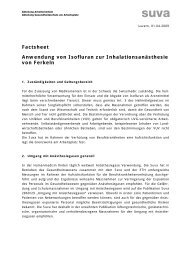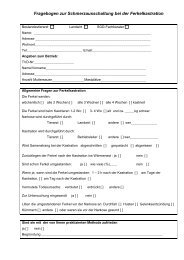Projekt ProSchwein Synthesebericht Projet ProSchwein Rapport de ...
Projekt ProSchwein Synthesebericht Projet ProSchwein Rapport de ...
Projekt ProSchwein Synthesebericht Projet ProSchwein Rapport de ...
Erfolgreiche ePaper selbst erstellen
Machen Sie aus Ihren PDF Publikationen ein blätterbares Flipbook mit unserer einzigartigen Google optimierten e-Paper Software.
Summary<br />
<strong>ProSchwein</strong><br />
To date, male piglets are surgically castrated during the two first weeks of life without anaesthesia<br />
in or<strong>de</strong>r to prevent the occurrence of boar taint in the meat which is mainly induced by<br />
androstenone, skatole and indole. This method will be banned in Switzerland by 1 st January 2009.<br />
Therefore, Suisseporcs launched the project <strong>ProSchwein</strong> in collaboration with the Swiss Veterinary<br />
Office (SVO), the Swiss Fe<strong>de</strong>ral Office for Agriculture (FOAG), the Swiss College of Agriculture<br />
(SCA), SUISAG, COOP and Migros. <strong>ProSchwein</strong> investigated alternative methods to the<br />
conventional castration of piglets and tested them un<strong>de</strong>r conditions of practice, i.e. methods based<br />
on surgical castration with anaesthesia (inhalation anaesthesia, local anaesthesia, and injection<br />
anaesthesia), methods without surgical castration (rearing entire male pigs, vaccination against<br />
boar taint, genetic selection) as the economical impacts and the acceptance of the methods.<br />
The test of an anaesthetic machine for inhalation anaesthesia (anaesthetic gas: isoflurane) with<br />
some 300 piglets un<strong>de</strong>r conditions of practice showed that this method provi<strong>de</strong>s a good<br />
anaesthesia for more than 90 % of the castrated animals if applied accurately and combined with<br />
an injection against postoperative pain. It complied with the requirements regarding occupational<br />
health and safety. The injection anaesthesia with ketamine/midazolam offers a potential alternative<br />
to the inhalation anaesthesia. Preliminary results of field studies revealed a good effectiveness with<br />
respect to pain relief. However, further investigations are required before this method can be<br />
implemented (e.g. with respect to the registration of the anaesthetic). Within a study based on 47<br />
piglets, a local anaesthesia conducted by a combined intratesticular and subcutaneous injection of<br />
lidocaine significantly reduced pain during castration. An exhaustive pain relief was not achieved,<br />
however.<br />
The studies on rearing entire male pigs revealed a good feed conversion ratio and a high carcass<br />
quality. The portion of carcasses with boar taint was at 6 % or more. According to the composition<br />
of the feed ration, it was possible to reduce the content of skatole and indole but not the amount of<br />
androstenone. The electronic nose <strong>de</strong>veloped by ALP Posieux is capable to <strong>de</strong>tect between 95<br />
and 100 % of the samples exhibiting boar taint according to the classical HPLC method at a<br />
laboratory scale. For a thorough selection of tainted carcasses, further work is necessary in or<strong>de</strong>r<br />
to <strong>de</strong>tect all the compounds that contribute to boar taint including their interactions. The application<br />
of the electronic nose in practice requires for technical adaptations which allow for operation un<strong>de</strong>r<br />
the conditions of a slaughter house. As far as such an appliance is not available, and the control of<br />
the amount of androstenone by means of genetic selection is not achieved, rearing entire male<br />
pigs will probably remain a niche market.<br />
The vaccination against boar taint prevents the production of androstenone and the occurrence of<br />
boar taint in male pigs without surgical castration. This method is already used in countries such as<br />
Australia, New Zealand or Brazil. The vaccine has been registered in Switzerland. Its registration<br />
approval in the EU is expected during this year. In a study at the research station ALP Posieux, the<br />
performance and the carcass quality of vaccinated animals were investigated. Vaccinated animals<br />
exhibited a similar growth performance and a better feed conversion ratio and a higher carcass<br />
quality compared to castrates. Additionally, the concentrations of androstenone and skatole in the<br />
fat of the vaccinated animals were very low. Investigations within the subproject genetic selection<br />
provi<strong>de</strong> preliminary information on contents of androstenone, skatole and indole in the Swiss Large<br />
White pig and on phenotypic correlations between the concentrations of these substances and<br />
parameters on performance.<br />
The investigations on economical impacts of alternative methods have shown that the alternatives<br />
based on anaesthesia and the vaccination against boar taint can be recommen<strong>de</strong>d from an<br />
economical point of view. The supplementary costs thereof (in the case of inhalation anaesthesia<br />
10




